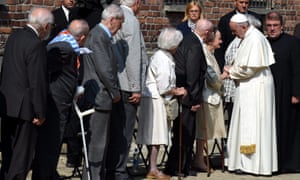Pope Francis visits Auschwitz death camp in silence
Pope Francis has
visited the Nazi death camps of Auschwitz-Birkenau, walking beneath the
infamous gates emblazoned with the words arbeit macht frei, work
sets you free. After arriving at the
museum and memorial to the 1.1 million people killed at Auschwitz-Birkenau
during the second world war, the pope sat alone on a bench for several minutes
of sombre contemplation and prayer.
Francis meets former Auschwitz prisoners. Photograph: Radek Pietruszka/EPA

Francis had said he wanted his visit – the third by a pope – to be conducted in silence. “I would like to go to that place of horror without speeches, without crowds – only the few people necessary. Alone, enter, pray. And may the Lord give me the grace to cry.” His only public words were written in the Auschwitz guest book: “Lord, have pity on your people. Lord, forgive so much cruelty.”

Francis had said he wanted his visit – the third by a pope – to be conducted in silence. “I would like to go to that place of horror without speeches, without crowds – only the few people necessary. Alone, enter, pray. And may the Lord give me the grace to cry.” His only public words were written in the Auschwitz guest book: “Lord, have pity on your people. Lord, forgive so much cruelty.”
Pope Francis calls for solidarity with refugees during speech in Kraków - Pontiff’s statement hours after landing in city could cause friction with Poland’s rightwing government
At Block 11, Francis
met a group of former inmates of the camp and some of those hailed as
“righteous among nations” for risking their lives to save Jews during the Nazi
occupation of Poland.
One passed him a lit
candle, which the pope carried to the “wall of death” at the end of the block’s
yard, in front of which several thousand inmates were shot dead.
The pope spent several
minutes alone in the cell of Maksymilian Kolbe, a Franciscan priest who
volunteered to take the place of a prisoner selected for death. Kolbe died on
14 August 1941 and was later canonised by Pope John Paul II. The visit falls on the
75th anniversary of the day Kolbe was condemned to death. After signing a
visitors’ book, Francis went to Birkenau, an adjacent camp, where he was to
meet more former inmates and people who helped to save Jews. Psalm 130 – “Out
of the depths I cry to you, Lord” – was recited by a rabbi in Hebrew.
Accompanying the pope
was Father Stanisław Ruszała, the parish priest of Markowa, where in 1942 the
parishioners Józef and Wiktoria Ulma and their seven children were shot dead
for sheltering eight Jews. Also present were the
Polish president, Andrzej Duda, and prime minister, Beata Szydło.
The vast majority of
those who died at Aushwitz-Birkenau were Jewish, but thousands of Polish
Catholics, Roma and Soviet prisoners of war also lost their lives.
Speaking before the
visit, Piotr Cywiński, the director of the Auschwitz-Birkenau memorial complex,
said: “There are places and tragedies which make you at a loss for words, where
actually there are no words to express what so many still see as unimaginable.”
He said the world was
markedly different today than at the times when previous popes visited
Auschwitz: John Paul II in 1979, and Benedict in 2006. “It is increasingly
internally divided, threatened with terrorism and deterioration of human
rights. It is a world where human solidarity is slowly being worn down. “If 15 years ago
someone had told us that we would so hysterically react to aiding refugees from
war-torn territories, I would never have believed it. “This is a world which
is desperately in need of a wise message, of being reminded of the fundamental
human truths. Auschwitz and the tragedy of the Holocaust sensitise us acutely
to these issues.”
Among the former
Auschwitz-Birkenau inmates who met the pope were:
Helena Dunicz
Niwińska, camp number 64118
Born in 1915, she
lived with her parents and brothers in Lviv. She was arrested with her mother
in January 1943 and taken to Auschwitz on 3 October. As a violinist she became
a member of an orchestra in the camp. Her mother died in December 1943.
Alojzy Fros, camp
number 136223
Born in 1916 in
Rybnik, he was arrested in April 1943 because of conspiracy work and deported
to Auschwitz in August 1943. He spent the first two months in the camp
hospital. After that he was hired to sort packages for prisoners.
Wacław Długoborski,
camp number 138871
Born in 1926 in
Warsaw, he was arrested there in May 1943 for conspiracy and was deported to
Auschwitz in August 1943. He was employed in the camp hospital in Birkenau
until the end of January 1945. After the war he worked as a university
researcher and research curator at the State Museum Auschwitz-Birkenau.
Zbigniew Kaczkowski,
camp number 125727
Born in 1921 in
Kraków, he was arrested in April 1943 and sent to Auschwitz. His mother, Zofia,
who died in the camp, was employed as a nurse in the camp hospital. In July
1944 he escaped from the camp but was captured and imprisoned in Block 11, then
deported to Buchenwald, where he was transferred to Ravensbrück.
Valentina Nikodem,
camp number 8737
Born in 1922 in Łódź,
she and her mother were taken to Auschwitz in July 1942 after her father killed
members of the Gestapo. Her mother died in the camp. Valentina worked in the
packaging department, and helped women who gave birth to children.
Marian Majerowicz,
camp number 157715
Born in 1926 in
Myszków, in October 1943 he was taken to Auschwitz, where his parents and
brother died. He is the president of the Association of Jewish Veterans and
Victims of World War II in Warsaw.
Eva Umlauf, camp
number A-26959
Now 74, she was taken
to Auschwitz as a two-year-old with her family in November 1944.
see also
